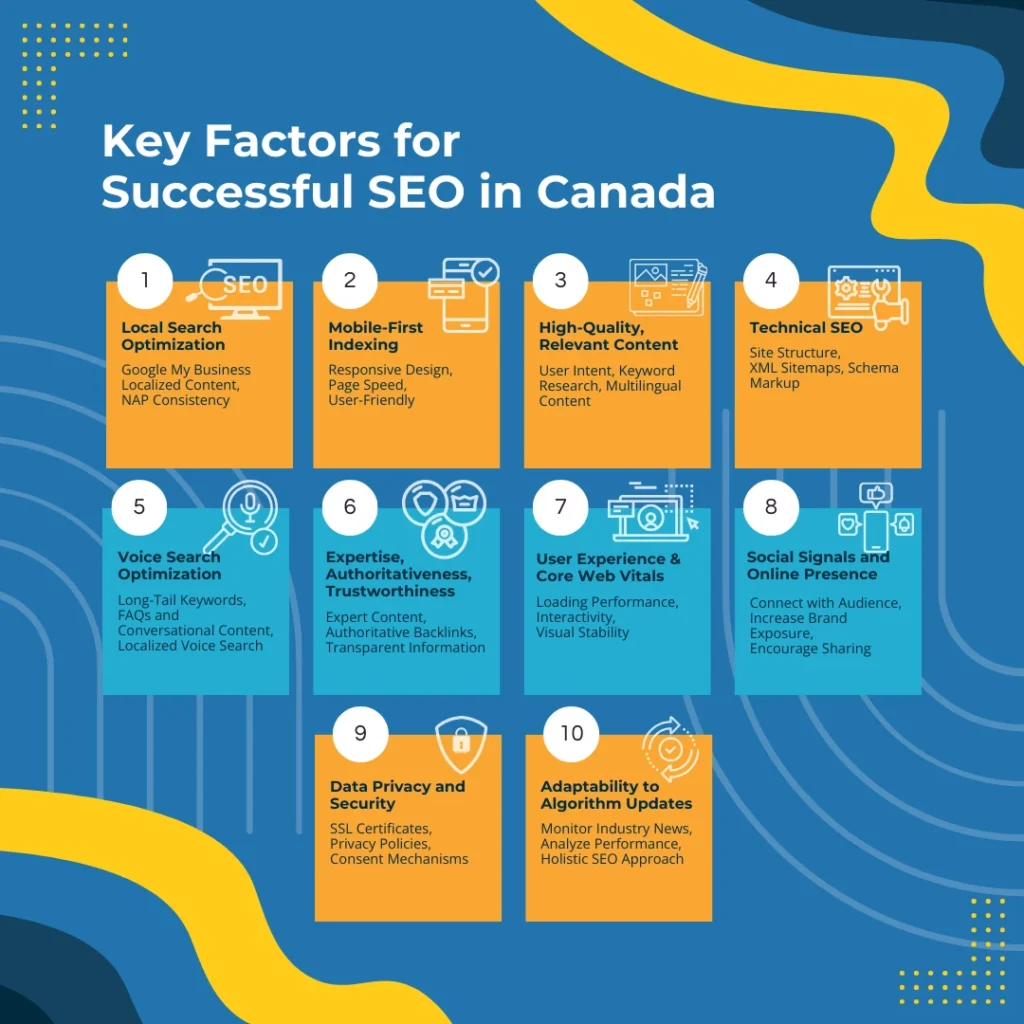Search Engine Optimization is an indispensable tool for businesses seeking to establish a robust online presence in the competitive digital landscape. In Canada, a country known for its diverse economy and technologically savvy population, understanding the unique nuances of SEO is vital for achieving visibility, driving organic traffic, and ultimately increasing conversions.
As the digital sphere continues to evolve, several key factors play a significant role in shaping successful SEO strategies in Canada. Here are some of the factors you should consider:

Local Search Optimization
Local SEO holds immense value in a vast country like Canada, where cities and provinces can have distinct preferences and consumer behaviors. What is popular and standard in one area of Canada might not hold true in other regions.
Many searches include local intent, such as “best coffee shop in Toronto” or “accountant in Vancouver.” This helps consumers find what they are looking for specifically.
If a business wants to capitalize on this trend, they must focus on local SEO strategies, including:
- Creating and optimizing Google My Business profiles: Accurate and up-to-date business information, such as address, phone number, and business hours, helps users find businesses quickly.
- Localized content: Developing location-specific content that resonates with the local audience and addresses their needs.
- NAP consistency: Ensuring consistency in the Name, Address, and Phone Number across all online directories and platforms. Differences in NAP data can confuse the algorithm and lead to delisting or lower listing on organic searches.
Mobile-First Indexing
Mobile usage has skyrocketed in Canada, making mobile-first indexing a crucial aspect of SEO strategies in Canada. Google’s algorithm prioritizes mobile versions of websites for indexing and ranking, ensuring that users have a seamless experience regardless of the device they use.
Websites that are not mobile-responsive risk lower search rankings and reduced user engagement. They won’t be able to reach a large portion of the online consumers, and that deficit is only going to increase in the coming years.
To excel in mobile-first indexing:
- Employ responsive design: Develop websites that adapt seamlessly to various screen sizes and orientations. There are many different smartphones that are popular and on the market.
- Optimize page speed: Fast-loading pages are essential for mobile users who expect quick access to information. This is even more important than with other platforms, as mobile users are often on the go and want immediate results.
- User-friendly navigation: Ensure that menus and buttons are easily clickable and accessible on mobile devices.
High-Quality, Relevant Content
Content remains the backbone of SEO strategies. In Canada, where users want more valuable information, creating high-quality and relevant content is paramount. Canadian businesses should focus on:
- Addressing user intent: Craft content that answers users’ questions, solves their problems and aligns with their search. Understanding the intent of a search can help you better craft the content.
- Keyword research: Identify relevant keywords that resonate with Canadian audiences and incorporate them naturally into content. Keywords used in Canada can be different from those used in American or British English.
- Multilingual content: In a bilingual nation like Canada, offering content in both English and French can broaden the reach. 20% of Canadians speak French as their primary language.
Technical SEO
Behind the scenes, technical SEO ensures that search engines can effectively crawl, index, and rank your website. In Canada, where the competition is savvy and competent, businesses need to pay close attention to technical aspects.
Here are some important areas of Technical SEO to be aware of:
- Site structure: Organize the website’s architecture in a logical manner, making it easy for both users and search engines to navigate. Any difficulty in navigation will reduce the ranking.
- XML sitemaps: Create and submit XML sitemaps to search engines to help them understand the structure of your website. Search engines want to deliver accurate and organized results to their customers.
- Schema markup: Implement schema to provide additional context about your content, enhancing the chances of rich snippets appearing in search results. This will help drive organic traffic.
Voice Search Optimization
Voice-enabled devices like smartphones and smart speakers are gaining traction in Canada. Optimizing for voice search requires understanding how people phrase queries in a conversational manner. People will search how they speak.
To excel in voice search optimization:
- Focus on long-tail keywords: People tend to use more natural language when speaking, leading to longer and more conversational queries.
- FAQs and conversational content: Create content that directly answers common questions users might ask voice assistants. This will help match your content to a user’s query.
- Localized voice search: Optimize for local voice search queries, as users often seek information about nearby businesses or services. People in different areas speak differently as well.
E-A-T: Expertise, Authoritativeness, Trustworthiness
Google places a strong emphasis on E-A-T, which stands for Expertise, Authoritativeness, and Trustworthiness. In Canada, where consumers are discerning and value credibility, businesses must showcase these qualities:
- Expert content: Demonstrate expertise in your field by publishing well-researched, accurate, and insightful content. This will help you become a thought leader in your area.
- Authoritative backlinks: Build high-quality backlinks from reputable sources to enhance your website’s authority. Educational, media, and government links have a high authority in Canada.
- Transparent information: Be transparent about your business, team, and credentials to establish trust with users. Customers want to deal with businesses they can personalize and connect with.
User Experience (UX) and Core Web Vitals
User experience has a significant impact on SEO rankings. Google’s Core Web Vitals focus on three key metrics: loading performance, interactivity, and visual stability. This is in addition to any technical SEO considerations.
To enhance user experience and meet Core Web Vitals standards:
- Optimize loading times: Minimize page load times to improve user engagement and reduce bounce rates. Customers want to have a smooth, responsive website to work with.
- Ensure interactivity: Users expect websites to respond promptly to their interactions. Implement features that provide a smooth browsing experience. Unusual stutters, pauses, or misdirection will lead to higher bounce rates.
- Maintain visual stability: Prevent unexpected layout shifts that can frustrate users and disrupt their navigation. Design consistency is a key consideration when building your website.
Social Signals and Online Presence
While social signals are not direct ranking factors, they play a role in boosting online visibility and driving traffic. Potential customers will react better to a business they can relate with and connect to.
Maintaining an active presence on social media platforms allows Canadian businesses to:
- Connect with the audience: Engage with users through posts, comments, and messages to foster a sense of community. This will increase loyalty to your brand and business from your customers.
- Increase brand exposure: Share valuable content and updates to increase brand recognition and reach. Position yourself as an authority whenever possible.
- Encourage sharing: Create shareable content that resonates with users and encourages them to share it across their social networks. This will increase your reach exponentially.
Data Privacy and Security
In an era of increasing data privacy concerns, Canadians value their online privacy. Ensuring your website complies with privacy regulations and provides a secure browsing experience is critical. Canada also has stricter laws than many countries in areas of privacy and online protection.
Here are a few of the things you need to be aware of:
- SSL certificates: Secure your website with SSL certificates to encrypt data transmitted between users and your server to give your customers peace of mind and protection.
- Privacy policies: Clearly communicate how user data is collected, used, and protected in your privacy policy. Customers will appreciate your focus on their well-being.
- Consent mechanisms: Implement clear and user-friendly consent mechanisms for data collection and cookies.
Adaptability to Algorithm Updates
Google’s algorithm is continually evolving, and staying updated with these changes is crucial for maintaining search visibility. In Canada, where competition is responsive and informed, businesses need to adapt quickly to algorithm changes.
Keep up with current updates by:
- Monitoring industry news: Stay informed about changes and updates in the SEO landscape to adjust your strategies accordingly. You never want to be the last to adopt a new practice or process.
- Analyzing performance: Regularly assess how algorithm updates affect your website’s rankings. Analyze traffic to identify areas for improvement.
- Maintaining a holistic approach: Focus on a mix of SEO techniques to build a strong foundation. This will help your business withstand algorithm changes.
SEO and Canada Businesses
The landscape of SEO in Canada is dynamic and ever-changing. It is shaped by evolving user behaviors, technological advancements, and search engine algorithm updates. By embracing these key factors and tailoring your strategies to the Canadian context, businesses can position themselves for success in the competitive online environment.
SEO should help you drive organic traffic, increase visibility, and achieve sustainable growth in Canada. It can be difficult to keep up with everything on your own. To help your business grow, you can trust the experts at Nozak Consulting.
